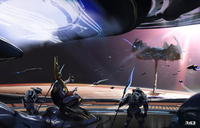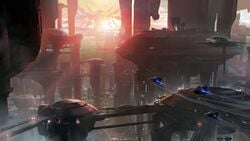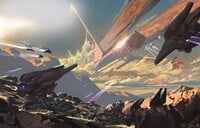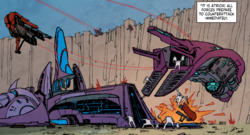Covenant worlds
From Halopedia, the Halo wiki

This article is part of a series on
Sangheili
- Technology
- History
- Culture, Politics & Economy
To check out information for other sapient species, see here!
Many countless worlds would fall under the control of the Covenant[1] in a "Covenant sphere".[2][3][4] The Sangheili's colonies were considered the Covenant's primary worlds.[5] Many Sangheili colonies were reforged into strongholds and fortresses capable of amassing vast military power.[1]
With each species added to the alliance, so too were their worlds added; on top of new worlds being settled and the subsuming of certain Forerunner installations.[5] Various physical materials from each of the incorporated species' homeworlds were used in the Skin of the First Worlds, itself a component of High Charity.[6]
As the Created came to control many of these worlds, only echoes of the empire remain.[7]
History[edit]
Pre-Covenant history[edit]
Pre-Great Purification[edit]
The Forerunners built numerous facilities on various other Covenant worlds including the Guardian Custode support areas on Sanghelios,[8] a portal to Sarcophagus from Hesduros,[9] and a facility in the Y'Deio system.[10] They also maintained facilities on other worlds that the Covenant would subsume such as Zhoist.[11]
The Former Age[edit]
- Main articles: The Former Age, Age of Abandonment
Following the Great Purification, an unknown complication occurred and the Forerunner starship Anodyne Spirit crashed onto the surface of Janjur Qom.[12][13][14] This would invariably lead to the War of Wills, where two factions would fight over control of the ship.
Several hundred years before the Covenant,[15] the Sangheili colonized dozens of worlds which ranged from thriving population hubs to frontier worlds with only a handful of pioneer keeps.[16] Qikost and Suban, the moons of Sanghelios, were among the first colonized, with the Sangheili setting up armories on Qikost[17] and mines on Suban.[18] The Age of Seven Worlds appears to have started about the time of or after the colonization of the seventh world.[19] Interstellar Sangheili colonies included Glyke,[1] Hesduros,[20] Codisfold,[21] and Ulgethon.[22] The 76th explored world was Creck.[17] These collective worlds were bound by blood and belief over any centralized authority.[15]
It was on one such colony world, Ulgethon, that the Sangheili first encountered the San'Shyuum thus commencing the War of Beginnings.[23] Fighting in the war would take place on other Sangheili colonies[17] such as Codisfold.[24] The Dreadnought which was in possession of the San'Shyuum at the time, would cause untold destruction on several Sangheili worlds.[25] Battling in the war would even reached Sanghelios itself.

Covenant era[edit]
Early era[edit]
Following the War of Beginnings, Sanghelios would be the capital of the Covenant until High Charity was completed.[26] The remaining Sangheili colonies became some of the primary worlds for the Covenant.[5] A few of these worlds would be given an alternate name by the Prophets. Glyke would be 'blessed' with the name "Sphere of Praise"[1] while Hesduros would be referred to as "Silent Homage" by San'Shyuum scientists.[20] The signing of the Writ of Union would however lead to the Rending which would take place at several points in Covenant space including Sanghelios.[17] It would also lead to the settlement and destruction of The Refuge. At roughly the same, the Covenant would undertake a secret mission to Janjur Qom.[27]
The homeworld of the Covenant,[28] High Charity began construction in 851 BCE over Sanghelios.[17] Construction of the station would continue over Tuluk'katho and eventually completed in 791 BCE.[25] In 648 BCE, the San'Shyuum would claim that their cradle world would be destroyed by stellar collapse.[29][30][10]
Incorporation and expansion[edit]
The Yanme'e species had at some point progressed in technology to the point of allowing them interplanetary travel and the colonization of two of their homeworld's moons.[31] In 1112, the Covenant discovered Palamok and would incorporate the species after warring with them for a time.[10] Following this, Sangheili and Yanme'e Queens would settle Malurok together.[32]
For several years prior to 1342, the Kig-Yar would wage war against the Covenant.[33] Eayn would subsequently be folded into the Covenant. The gas giant in which it orbited would eventually become the only known Covenant controlled world to humanity prior to first contact.[34][35]
In 2142, Balaho and the Unggoy species were discovered by the Covenant subsequently brought under their authority.[36] Balaho would eventually become a backwater in Covenant space with most shipping routes avoiding it.[35]
In at least one case, the Covenant wiped out an unidentified civilisation on the planet Karava[37] and settled the world afterward.[38]
In 2462, the Unggoy Rebellion began. In a play to end the conflict, the Covenant would end up glassing part of Balaho.[39][36]
The Jiralhanae had managed to achieve spaceflight and established colonies within the Oth Sonin system.[40] Shortly prior to 2492, Doisac suffered a nuclear war known as the Great Immolation. In 2492, the Covenant would find and quickly incorporate Doisac and the Jiralhanae into the Covenant.[41] Since then, the San'Shyuum settled Jiralhanae on resource-rich worlds to guard them against anyone seeking to claim them for themselves;[42] mostly ambitious members of the other client species.[43]
At some point following 2492, but before 2531, new tithes were implemented by High Charity. In response, a series of heretical uprisings took place on various Covenant worlds. Avitus would be sent to quell these rebellions.[44]
War of Annihilation[edit]
- Main article: Human-Covenant War
Early in the War of Annihilation, the UNSC counterattacked the invading Covenant and struck at Zhoist. This would result in the regional capital of the Ring of Mighty Abundance being destroyed,[45] along with UNSC Nuclear weapons destroying two out of the Ten Cities of Edification.[46]
The UNSC would make further attempts to strike Covenant-controlled worlds. In 2537, SPARTAN-III Alpha Company was deployed to asteroid K7-49 in order to disrupt Covenant operations there. While they succeeded, 300 SPARTAN-IIIs were killed in the process.[47] A similar action would be repeated at Pegasi Delta in 2545 with Operation: TORPEDO. While also a victory, it would cost the lives of 298 SPARTAN-IIIs of Beta Company.[48]
At some point during the war, Linda-058 was deployed to the world of Odenli'sh to assassinate a San'Shyuum missonary.[49]
As well, in 2552, the Office of Naval Intelligence had made a breakthrough and learned the locations of several Covenant worlds including Sanghelios and Glyke. With this knowledge, when Condition Endgame was declared at the Battle for Earth, Operation: SUNSPEAR began resulting in Gray Team being deployed to Covenant space.[50]
At the onset of the Great Schism,[51] the Hierarchs would also order an attack on the Bloodbrave Guardians of Suban at Suban, resulting in only a single survivor.[52] As well, the world Joyous Exultation would act as a rallying point for the Sangheili.[1] A NOVA bomb was detonated there by accident resulting in a quarter of the world being vaporized and its moon shattering.[53] The conflict would result in most of the San'shyuum governors of the various Covenant worlds joining the rest of the species on their mass exodus.[54]
Postwar and Covenant dissolution[edit]
- Main articles: Sangheili-Jiralhanae war, Blooding Years
Just days after a tentative peace treaty was formed between the group that would become the Swords of Sanghelios and the UEG, the Sangheili colony of Glyke was mysteriously destroyed, killing billions. Rumors had it that the colony's destruction was either an internal conflict or a Jiralhanae retaliation, but in truth it was destroyed by SPARTAN-II Gray Team with a NOVA bomb as part of Operation: SUNSPEAR, an effort to strike a blow at a major enemy world to try to cause the Covenant to reconsider. Having last heard that Earth was under attack, Gray Team were unaware of the war's end due to damaged deep-space communications equipment and thus that their mission was no longer necessary.[50]
After the dissolution of the Covenant and the exodus of the local San'Shyuum governors,[54] many of the Covenant worlds fell into the control of various factions such as Sephune III ending up under Jul 'Mdama's Covenant,[56] or Otraak under the Banished.[57] Some worlds were contested between species and governments,[38] while Joint Occupation Zones were established between the Unified Earth Government and the Swords of Sanghelios to allow colonies to be administrated by multiple species.[58]
The destruction of High Charity would lead to the former Covenant's worlds going into disarray with many of each species returned to their respective homeworlds[7] including the Yanme'e.[59] Sangheili soldiers returned to Sanghelios to find feuding and civil unrest.[60]
The various Sangheili colonies fell into internecine conflict[61] such as on Malurok.[62] These conflicts would see many Rwaru-pattern carracks pulled into military service, which would cripple much of the interstellar commerce binding the Sangheili worlds together.[63] Sangheili colonies also had to contend with raids and other fighting with the Jiralhanae.[42][2][64] Similarly, Jiralhanae worlds also became embroiled in internecine conflict as rival clans fought each other for a number of reasons including land.[7] The worlds placed under Jiralhanae control would be used leverage against humanity and other members of the Covenant, though many of the dominant master-packs lacked the knowledge to fully exploit the worlds.[43]
In contrast, the Kig-Yar interplanetary colonies and Balaho remained stable though Buwan was abandoned.[61]
Just prior to the Created uprising, Doisac and its moons had become a base of operations for most pirates in the Orion Arm. At the same time, independent packs were consolidating under the Banished.[65]
Some survivors from Saepon'kal were able to be evacuated and resettled an uninhabited world in the Emauzs system later named Om'a'Varo.[66]
Legacy[edit]
- Main article: Created uprising

As the Created uprising began to take shape in 2558, a global war started on Sanghelios.[67] With the onset of the Cortana Event, Sanghelios was directly hit by Guardian Custodes[68] and despite proximity, Suban suffered minimal damage.[69] The immediate loss of communications and disruption of logistics would inhibit previously ongoing independence movements on Qikost.[70]
The Cortana Event did not affect the Urs system alone. Created forces would end up occupying Malurok, prompting a detente among the warring parties on the world.[62]
Balaho sided with the Created, meaning no Guardian was sent to the world.[71] Old factories were reactivated and supplies from the Created were shipped to the planet.[72] A skirmish would break out on the planet between various forces of the UEG and Unggoy on the planet.[71]
Doisac was hit quite hard, being completely destroyed by a fleet of Guardians on the direct orders of Cortana.[73] The exploding debris of the planet would obliterate the moon of Soirapt, and heavily damaged the moons of Teash and Warial. A large amount of survivors from Teash managed to resettle on the colonies of Gathved, Ordun Dal, and Savadok.[74] The news of this action would reach the Sangheili on Sanghelios three days later, around the time of the High Gathering where the Concert of Worlds was proposed.[75]
Government and politics[edit]
Administration[edit]
Interstellar[edit]
Collectively, the non-cradle worlds of the Covenant were referred to as "tithe worlds"[1][16] and described as protectorates.[76] Worlds employed with military planning and production were known as "fortress worlds."[77] The fortress worlds would often be patrolled by Ekesan-pattern Umbras[78] and vast urban areas would require transport in vehicles such as the Iqnucekk-pattern transports, Maravelotz-pattern transports, and Khaulio-pattern administrators.[79] Overall, these key fortress and stronghold worlds served as key proxies for High Charity in administering the empire.[80]
Spread throughout the empire were regional capital sites known as harborages; city-ships and command-and-control centers. From them, the Prophets could be broadcasted, Covenant starships could be resupplied, and Forerunner artifacts safeguarded. As well, each inhabited system was given a Coordination platform and garrison overseen by the Ministry of Concert. Smaller platforms were placed in strategic locations.[45]
The High Council was responsible for the administration of these interstellar territories, assigning tithes and levies, and allocating resources across the numerous member worlds.[4] San'Shyuum governors handled administrative duties on a local scale.[54] Hundreds of Covenant worlds had their own emissaries, some of which would be sent to High Charity.[6] Trade between these worlds appeared to have been handled by more local authorities, such as Ghe 'Talot's clan would supply production materials to Kolaar Manufactorum on Sanghelios.[81] The level of incorporation into the Covenant government also varied, with Eayn for example, not being fully integrated.[54]
Worlds known to the Covenant had information recorded to the Covenant World Registry.[82] On some stellar charts, systems can be given a scarlet colored border, which means "Forbidden".[83] The scale and complexity of the Covenant and it's empire was such that entire worlds and sub-domains often disappeared from official records for decades, prior to contact being reestablished.[4]
Planetside[edit]
Covenant planets had considerable autonomy in running their own affairs.[45] However, the Covenant maintained local sites of administration, such as their site along the Zota'hal Sea on Saepon'kal.[1]
Sangheili[edit]
Sangheili planets are run in a style similar to feudal manorialism. Multiple Sangheili clans ally together and are led by a single Kaidon who controls the surrounding territory from a fortified keep. Smaller Sangheili colonies are often governed by only a handful of keeps, which control the entirety of the world's resources. On larger worlds like Sanghelios, hundreds of keeps vie for power and influence using politics and military force.[60][15]
In more modern times, some major keeps evolved into fully fledged city-states that ally with lesser kaidons.[60]
After the fall of the Covenant, some keeps have transformed into military sects.[15]
Jiralhanae[edit]
Doisac was largely controlled by two skeins, or master-packs.[64] Several of their other settled worlds were controlled by master-packs.[43] Despite being settled on numerous resource worlds by the San'Shyuum, the Jiralhanae lacked the ability to mine the resources themselves.[42][43]
Kig-Yar[edit]
For the Kig-Yar, and in the case of Eayn specifically, it is ruled by an alliance of arch-matriarchs[84] with pseudo-governments on the world being ochlocracies and Luck egalitarianism forming the base of justice systems.[85] Some of these pseudo-governments ruled over full continents of the world such as with the continents of Ruuht and Ah'lomet.[86]
Fringe[edit]
- Main article: Covenant fringe
Most of the Fringe species were relegated to their homeworld or remote locations and most often locally administered by San'Shyuum executors and a cortege of Kig-Yar enforcers.[87] Fringe space would be protected by Covenant fleets such as the Fleet of Recalcitrant Ire.[88]
Scale[edit]
The Covenant controlled thousands of star systems at its height.[4] These systems and worlds were based primarily out of the Orion Arm.[28][89][90][Note 1] The Covenant fringe's worlds were scattered around the Orion Arm.[91] A world would often be left untouched by the Covenant unless it offered particular treasures, both religious and practical.[5]
A few Covenant worlds like Strilun IV[92] and Ealen IV[42] were near human occupied space. The space between Covenant space and human space was referred to as "wild space".[76] The Svir system was considered near the Urs system.[93] A region of space for the Kig-Yar also existed.[94]
Sangheili[edit]
Around the time of the War of Beginnings, 76 worlds were explored by the Sangheili.[17] By the time of the Post-Covenant War conflicts, there was a primary "complex"[95] or "core sphere"[2] of Sangheili worlds. The total amount of Sangheili worlds was equivalent to that of humanity's colonies.[96] There was also a "Sangheili frontier"[64] and a region of space known to the Sangheili called the Out Sectors.[97]
List of known worlds[edit]
Non-canon and dubious canon appearances[edit]
Silver Timeline[edit]
- Main article: Silver Timeline
| This article contains information about the Silver Timeline, and is not a part of the established Halo canon. |
The Covenant are known to have a prescence in the Aspero system at the planet of Raas Kkhotskha.
Notes[edit]
- ^ The Halo Waypoint article for the Covenant claims that the empire "dominated much of the galaxy". Similarly, the 2022 Halo Encyclopedia uses the word "galaxy" to describe their dominion. However, a number of sources (including Halo: Warfleet and several Waypoint articles) agree that the Covenant Empire was based out in the Orion Arm. Likely the use of "galaxy" in this context is a colloquialism.
Sources[edit]
- ^ a b c d e f g Halo Encyclopedia (2022 edition), page 232
- ^ a b c Halo Waypoint Forums, Catalog Interaction (Retrieved on Oct 21, 2018) [local archive] [external archive]
- ^ Halo Waypoint Forums, Catalog Interaction (Retrieved on Apr 13, 2016) [local archive] [external archive]
- ^ a b c d Halo: Warfleet, page 52
- ^ a b c d Halo Waypoint - Universe, Factions, Covenant (Retrieved on Jun 1, 2020) [local archive] [external archive]
- ^ a b Halo Encyclopedia (2022 edition), page 227
- ^ a b c d Halo Encyclopedia (2022 edition), page 194-195
- ^ Halo 5: Guardians, campaign level Alliance
- ^ Halo: The Thursday War, page 398-399
- ^ a b c Halo Encyclopedia (2022 edition), page 192
- ^ Halo: Silent Storm, chapter 26
- ^ Halo Waypoint - Universe, Characters, Mendicant Bias (Retrieved on Oct 30, 2021) [local archive] [external archive]
- ^ Halo Encyclopedia (2011 edition), page 27
- ^ Halo Encyclopedia (2022 edition), page 384-385
- ^ a b c d Halo Encyclopedia (2022 edition), page 198-199
- ^ a b Halo Encyclopedia (2022 edition), page 234
- ^ a b c d e f Halo: Broken Circle, chapter 1
- ^ Halo: The Essential Visual Guide, page 128
- ^ Halo: Outcasts, chapter 6
- ^ a b Halo Encyclopedia (2022 edition), page 235
- ^ Halo Encyclopedia (2022 edition), page 258
- ^ Halo Encyclopedia (2022 edition), page 191
- ^ Halo 2: Anniversary, Terminal 5
- ^ Halo Encyclopedia (2022 edition), page 258
- ^ a b Halo Encyclopedia (2022 edition), page 226
- ^ Halo Encyclopedia (2022 edition), page 229
- ^ Halo: Broken Circle, chapter 5
- ^ a b Halo Encyclopedia (2022 edition), page 188-189
- ^ Halo 3, Bestiarum: San'Shyuum
- ^ Halo Encyclopedia (2009 edition), page 113
- ^ Halo Encyclopedia (2022 edition), page 205
- ^ Halo: Warfleet, page 55
- ^ Halo Encyclopedia (2022 edition), page 206
- ^ Halo 3, Bestiarum: Kig-Yar
- ^ a b Halo Encyclopedia (2011 edition), page 307-308
- ^ a b Halo Waypoint - Universe, Species, Unggoy (Retrieved on Aug 4, 2020) [local archive] [external archive]
- ^ Halo Encyclopedia (2022 edition), page 289
- ^ a b Halo: Escalation, issue 5
- ^ Halo 2: Anniversary, Terminal 10
- ^ Halo Encyclopedia (2011 edition), page 309
- ^ Halo: Contact Harvest, page 194
- ^ a b c d Halo: Escalation, issue 1
- ^ a b c d Halo Waypoint, Canon Fodder - System Shocks (Retrieved on Jun 30, 2023) [archive]
- ^ Halo Encyclopedia (2022 edition), page 254
- ^ a b c Halo Encyclopedia (2022 edition), page 225
- ^ Halo: Silent Storm, Epilogue
- ^ Halo: Ghosts of Onyx, page 83-86
- ^ Halo: Ghosts of Onyx, page 16-27
- ^ Halo Waypoint - Universe, Characters, Linda-058 (Retrieved on Oct 30, 2021) [local archive] [external archive]
- ^ a b Halo: Envoy, chapter 12
- ^ Halo Infinite, High Value Target dossier, Okro 'Vagaduun
- ^ Halo Encyclopedia (2022 edition), page 458
- ^ Halo: Ghosts of Onyx, page 244-245
- ^ a b c d Halo: Warfleet, page 54
- ^ Halo: Rise of Atriox, issue 4
- ^ Halo: Lone Wolf, issue 2
- ^ Halo: Rise of Atriox, issue 3
- ^ Halo: Fractures - Oasis
- ^ Halo Encyclopedia (2022 edition), page 204
- ^ a b c Halo Waypoint - Universe, Species, Sangheili (Retrieved on Jun 1, 2020) [local archive] [external archive]
- ^ a b Eleventh Hour reports, Report 2
- ^ a b Halo Encyclopedia (2022 edition), page 233
- ^ Halo Encyclopedia (2022 edition), page 270
- ^ a b c Halo: Envoy, chapter 3
- ^ Halo: Official Spartan Field Manual, page 90
- ^ Halo: Outcasts, chapter 4
- ^ Halo: Legacy of Onyx, chapter 21
- ^ Halo: Bad Blood, chapter 1
- ^ Halo Encyclopedia (2022 edition), page 230
- ^ Halo Encyclopedia (2022 edition), page 231
- ^ a b Halo: Bad Blood, chapter 3-4
- ^ Halo Waypoint, Canon Fodder - Driving Force (Retrieved on Sep 22, 2017) [archive]
- ^ Halo Infinite, campaign level Repository
- ^ Halo Encyclopedia (2022 edition), page 446-447
- ^ Halo: Outcasts, chapter 1
- ^ a b Halo: Outcasts, chapter 23
- ^ Halo Encyclopedia (2022 edition), page 189
- ^ Halo Encyclopedia (2022 edition), page 275
- ^ Halo Encyclopedia (2022 edition), page 219
- ^ Halo Waypoint, The New Halo Encyclopedia is Out Today (Retrieved on Mar 11, 2023) [archive]
- ^ Halo: Outcasts, chapter 4
- ^ Halo: Outcasts, chapter 4
- ^ Halo: Broken Circle, chapter 19
- ^ Halo: Warfleet, page 54
- ^ Bestiarum
- ^ Halo Waypoint Forums, Catalog Interaction (Retrieved on Apr 13, 2016) [local archive] [external archive]
- ^ Halo Encyclopedia (2022 edition), page 214
- ^ Halo Waypoint, Canon Fodder - Covering Fire (Retrieved on Jan 31, 2024) [archive]
- ^ Halo: Warfleet, page 12-13
- ^ Halo Waypoint - Universe, Species, San'Shyuum (Retrieved on Jun 1, 2020) [local archive] [external archive]
- ^ Halo Waypoint - Universe, Characters, Axl (Retrieved on Jan 19, 2021) [local archive] [external archive]
- ^ Bungie.net, Bungie Weekly Update 01/11/08: "It’s on an alien world discovered and controlled by the Covenant. It’s location is secret, but it is in this spiral arm of the Galaxy. Close to human occupied space. If you look through the glass floors of the Covenant structures, you’ll see Forerunner artifacts buried beneath the ice." (Retrieved on Jan 30, 2021) [archive]
- ^ Halo: Contact Harvest, chapter 16
- ^ Halo Waypoint, Canon Fodder - Fleetcom Fiction (Retrieved on Aug 14, 2024) [local archive] [external archive]
- ^ Halo: Hunters in the Dark, page 87 (Google Play edition)
- ^ Halo: Outcasts, chapter 12
- ^ Halo: Outcasts, chapter 2
- ^ Halo: Legacy of Onyx, chapter 8
- ^ Halo Waypoint, Canon Fodder - Tasty Tomes (Retrieved on Mar 24, 2025) [local archive] [external archive]




